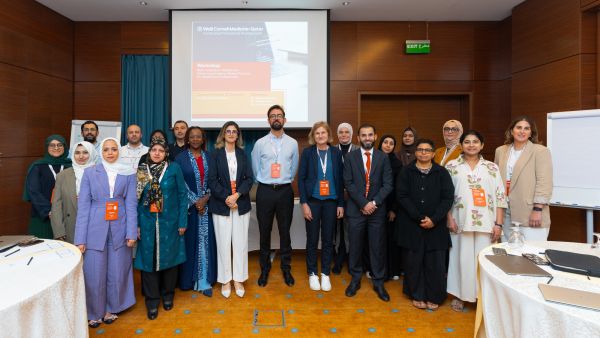WCM-Q workshop highlights growing importance of meta-analysis in healthcare

The Division of Continuing Professional Development (CPD) at Weill Cornell Medicine-Qatar (WCM-Q) recently held a workshop focused on equipping healthcare professionals with practical skills to accurately analyze and apply research evidence in medicine.
Attended by over 30 physicians, nurses, dentists, pharmacists, allied health professionals, students, and researchers, the two-day workshop aimed to enable participants to use R and Stata to conduct meta-analyses; evaluate heterogeneity and quality of evidence (using GRADE) to ensure methodological rigor; and translate meta-analysis findings into clinical and research practice.
The first day of the workshop provided an introduction to systematic review and meta-analysis, along with theoretical and practical exercises on data extraction. The day concluded with a demonstration and practical exercises in R and Stata. The second day featured discussions on heterogeneity, sensitivity, publication bias, and meta-regression, followed by demonstrations and hands-on learning to solidify the content.
Titled “Meta-Analysis in Healthcare: Advancing Evidence-Based Practice for Healthcare Professionals,” the workshop was directed by Dr. Alaa Ali Abd-Alrazaq, an assistant professor at WCM-Q who has authored more than 20 systematic reviews and meta-analyses published in high-impact international journals, and who also served as a speaker.
Other speakers included Dr. Jennifer Hirst, a senior research fellow at the Nuffield Department of Primary Care Health Sciences, University of Oxford, who has led or contributed to over 20 systematic reviews and meta-analyses combining data from intervention, observational, and diagnostic accuracy studies as well as network meta-analyses; and Dr. Jose Ordonez-Mena, a senior medical statistician at the Clinical Informatics and Health Outcomes Research Group at the Department of Primary Care Health Sciences, University of Oxford, experienced in complex meta-analysis methods and author of several systematic reviews and meta-analyses.
They were joined by Dr. Sonia Chaabane, an epidemiologist and senior specialist in population health research at the Institute for Population Health (IPH) at WCM-Q, as well as an instructor in population health sciences. She has published several systematic reviews and meta-analyses in addition to primary studies.
Dr. Abd-Alrazaq said: “The workshop focused on ensuring that healthcare professionals are well-equipped with the meta-analysis skills needed to accurately analyze and apply research evidence. Ultimately, this promotes the effective use of evidence-based healthcare practices that lead to improved patient care. We were extremely pleased with the level of interest shown in the workshop and look forward to hosting similar sessions in the future.”
The workshop was accredited in Qatar by the Department of Healthcare Professions-Accreditation Section (DHP-AS) of the Ministry of Public Health (MoPH) and internationally by the Accreditation Council for Continuing Medical Education (ACCME).
Background Information
Weill Cornell Medical College in Qatar
Weill Cornell Medicine - Qatar is a partnership between Cornell University and Qatar Foundation. It offers a comprehensive six-year medical program leading to the Cornell University M.D. degree with teaching by Cornell and Weill Cornell faculty and by physicians at Hamad Medical Corporation (HMC), Aspetar Orthopedic and Sports Medicine Hospital, the Primary Health Care Corporation, the Feto Maternal Center, and Sidra Medicine, who hold Weill Cornell appointments. Through its biomedical research program, WCM-Q is building a sustainable research community in Qatar while advancing basic science and clinical research. Through its medical college, WCM-Q seeks to provide the finest education possible for medical students, to improve health care both now and for future generations, and to provide high quality health care to the Qatari population.






